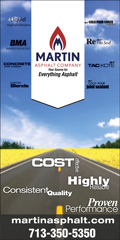| Wednesday, September 2, 2016 | ||
 |
 |
 |
| Past Issues | www.texasasphalt.org | Printer-Friendly | Subscribe | Advertise |
Environmental, Health and Safety Brief for August
Safety
One Third of American Workers Say Their Employers Prioritize Productivity over Safety
National Safety Council survey finds workers in high-risk jobs such as construction are afraid to report safety issues. Sixty percent of respondents in the construction industry felt safety was less of a priority than finishing tasks. These findings are particularly alarming because the construction industry is very high on the list when it comes to the number of occupational deaths each year.
The number of workplace deaths in 2014 was as high as it has been since 2008, according to data from the Bureau of Labor Statistics. More than 4,800 workers died from incidents such as car crashes, contact with objects or equipment, exposure to harmful substances, and slips, trips and falls.
Gauging Americans' perceptions toward their safety at work may help provide further insight into the increasing numbers of workplace deaths. Consider the following:
• 49% of temporary and contract workers, and 41% of employees working in healthcare settings, said they were afraid to report safety issues.
• 62% of construction workers believe management does only the minimum required by law to keep employees safe.
Oddly, in the survey of 2,000 employees, 70% say safety training is part of their orientation and that employee health and well-being is promoted at work. So what does this tell us as an industry? We invest in training and health but for some reason employees still believe production overrides safety. As business owners and managers we have a challenge to change perception and/or the truth about safety and production. Safe production provides not only a healthy and happier workforce but also results in higher profits for the company. There really are no negatives to working safely!
For those who are interested in improving their safety culture they can join the National Safety Council’s Journey to Safety Excellence, which provides a roadmap for reducing incidents and saving lives. Click here for more information.
Environmental
Minimize Your Liability with Environmental Audits
"Minimize your liability—that’s the best reason for conducting environmental audits. The audit’s findings help your company bring to light areas of noncompliance so you can implement corrective measures before federal or state inspectors visit your facility.
An easy checklist that shows you how to plan your environmental audit strategy and factor in the audit’s risks of exposure, its scope, its participants, and its decision-making structure can be found by clicking here.
Reminder: If you have hot mix facilities or other facilities that currently operate under Multi-Sector General Storm Water permits (TXR050000) then you have until November 14, 2016, to renew those permits with the TCEQ. For more information click here.
Health
Zika virus
OSHA and NIOSH urges employers to train employees on the risks of exposure to the Zika virus..
The Zika virus was found in the Americas and the Caribbean in 2015. Symptoms include fever, rash and joint pain and is primarily spread through mosquito bites. At-risk employees include those who may be exposed to mosquitoes, such as mosquito-control workers, other outdoor workers (such as employees in our industry) and people who travel for business; as well as health care and laboratory workers who may be exposed to the bodily fluids of infected individuals. Symptoms include fever, rash and joint pain. The virus, which can spread from a pregnant woman to her fetus, has been linked to a serious birth defect of the brain.
Some guidelines to protect against the virus for outdoor workers:
• Use outdoor insect repellent.
• Wear clothing treated with permethrin but do not use the repellent directly on the skin.
• Remove standing water around a workplace because it is a common breeding ground for mosquitoes.
• Empty/scrub/turn out water-holding items once a week.
• Tightly cover water-storage containers.
• Wear clothing that covers the hands, arms and legs.
• Drink plenty of water.
• Take rest breaks in shaded areas.
CDC (Center for Disease Control) also advises employers of outdoor workers to issue reminders about wearing appropriate clothing and inform workers about Zika virus. If an employer suspects a worker has been exposed to Zika, he or she should do the following:
• Ensure all potentially exposed people are made aware of the symptoms of Zika.
• Train workers to seek medical attention if they develop symptoms.
• Ensure workers receive prompt medical attention.
• Consider granting sick leave during the infectious period.
An OSHA fact sheet on the virus can be accessed by clicking here. |
Asphalt: Smooth | Durable | Quiet | Safe




